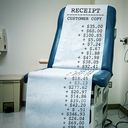The doctor will fee you now

Need a sick note from the doctor? Or have them OK a refill? It might cost you.
Why it matters: From signing patient documents to emailing responses to patient questions, doctors are increasingly charging fees for administrative tasks.
- Fees ranging from a few bucks to a few hundred dollars for paperwork requests risk annoying patients who are used to getting such services for free. But experts say it's a natural response to growing demands on physicians' time and shrinking reimbursement.
"Basically physicians are saying, 'The things that I used to do for free, I can't afford to do it now,'" Robert Pearl, a Stanford University professor and former CEO of The Permanente Medical Group, told Axios. "It's actually much more than just the money. It's really my time."
- Responding to a flood of emails from patients and fielding requests for documents can add hours to a doctor's day for work that would otherwise go unpaid.
- "I know a lot of people who have not had [a fee] now thinking about putting it in because they're overwhelmed," Pearl said.
The big picture: The pandemic is partly to blame. Doctors are more burned out than ever, and the shift to virtual care has made more patients accustomed to interacting with their doctors online.
- That's generally seen as a good way to improve patient access to care — until it becomes too much.
- The growth in high-deductible health plans, which require patients to shoulder more of the cost of their care, also means that patients are looking for ways to avoid visits and so they may message their doctors instead, Pearl said.
- Patients aren't always good at differentiating between what they should be emailing their doctor about and what can wait, said A. Jay Holmgren, an assistant professor at the University of California, San Francisco's Center for Clinical Informatics and Improvement Research.
- As emails from patients jumped during the pandemic, more health care providers started charging fees for responses.
- Holmgren and colleagues in a JAMA study last year found those fees were associated with a slight decline in patient emails.
- While patients do email with worthwhile questions, "There's also a set of things that I sometimes refer to as 'Call your mother,'" Holmgren said.
- The hope is that fees for emails and other medical documentation can help weed out non-urgent requests while ensuring doctors can respond to those with more pressing matters.
Between the lines: Employers may also be driving some of the demand on physicians' time.
- More employers also seem to be asking workers for doctors' notes for taking sick days, said Michael Botta, co-founder of Sesame, a startup primary care provider that patients pay directly rather than using insurance.
- Last year, Sesame began advertising a $29 service for doctors' notes, which included a virtual visit that would result in the letter if deemed appropriate.
- It was in response to growing frustration from patients over the cost of pricier settings like urgent care, Botta said.
- "All of a sudden now you've got these demands from employers and all these other people saying, 'I want medical documentation from your clinician.' Those things are taking up real time and resources," he said.
The intrigue: Primary care providers in some markets are growing more reliant on the concierge model — in which patients pay a monthly or annual fee for access to doctors who tout their accessibility to patients — that help cover administrative costs insurance won't, Pearl said.
- "You can basically create the same income with about half the number of patients," he said.
What to watch: Providers may back off these fees if their economic picture improves or artificial intelligence takes on more of the administrative burden, said Jon Freedman, a digital strategist with health care consulting firm Chartis.
- "It is a margin-generating kind of thing. It is a workforce happiness kind of thing for a burned out group of doctors who are answering messages in their spare time," he said.
- That being said, it can be off-putting for patients and even create concerns about access, he said. "I would argue that doing things like that — using the messaging as an example — isn't really addressing the underlying problems of how health systems work."